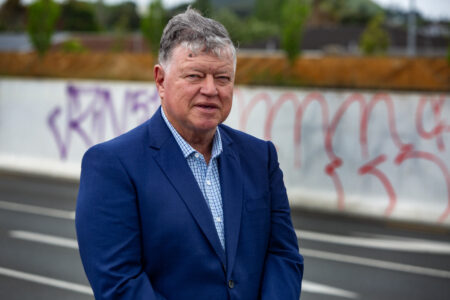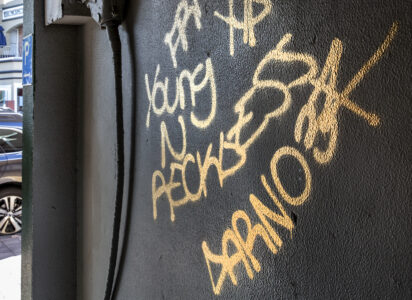
A well-known east Auckland resident is publicly issuing a warning about New Zealand’s escalating crime situation, which he says reminds him of the troubled nation he left two decades ago.
Dave Upfold isn’t the only South African expat to tell the Times in the past year of their concerns about rising crime here.
Headlines from around New Zealand in recent years have detailed the frequency of ram-raid and smash-and-grab burglaries, assaults, vehicle thefts, sexual assaults, armed and aggravated robberies, gang warfare, drive-by shootings and homicides.
Among the statistics revealed this year were a 70 per cent increase in gang membership, a 55 per cent increase in ram-raids, a 46 per cent increase in victimisations, and a 140 per cent increase in serious assaults.
Upfold, who lives in Pakuranga, served as mayor of Queensburgh, a town in KwaZulu-Natal, from 1992 to 1995 and in that role was involved in numerous anti-crime initiatives including accompanying officers in the police helicopter.
He moved with his family to Auckland in 2002 and says before they left South Africa they “could see the writing on the wall” about the lack of law and order.
He personally knows many people who migrated for that reason.
“I would estimate for half the people who have come out here, it was because they’ve been affected by crime.
“For a lot of people who left South Africa, crime has been the motivator.”
Upfold has noticed an increase in minor incidents in his community such as graffiti vandalism and littering, which he sees as a sign of a slack attitude toward bad behaviour.
“You can see what’s happening. They don’t tend to fix the problem.
“It’s ‘it will wash itself off’ or ‘we’ll paint it out’, but then someone else will come and redo it again and again.
“The problem isn’t caused by thousands of people. It’s a handful of people and you’ve got to stop that handful.
“If you go back to the similarities between South Africa and here, the same thing happened.
“Graffiti, littering, petty crime, theft from vehicles, break-ins at shopping centres, and then they take it a step further.”

His observation is borne out by the fact there was a 39 per cent increase in graffiti vandalism in the Howick Local Board area last year compared to 2022.
There were 374 more incidents of tagging reported than the prior year, with 1328 cases of graffiti removed from within east Auckland in a 12-month period.
Another way in which Upfold sees New Zealand becoming like South Africa is the increasing steps people have to take to secure their homes.
One example comes from when the home of one of his neighbours was broken into.
“Now, automatically once there’s a break-in, you’ve got to put in security gates and burglar alarms,” he says.
“The house is so fortified now and that’s what happened in South Africa.
“In South Africa, to have insurance that was affordable, or to have an insurance company that would accept your business, you had to have security gates.
“You lived behind barbed wire or behind burglar guards [bars] on the windows.
“It’s coming here. Insurance premiums are going up fast and why – to pay for claims.”
Other South African expats living in east Auckland were the victims of a burglary earlier this year.
Their Botany Downs home had items including jewellery and “priceless” military medals stolen from it during a brazen daytime break-in.
The victim told the Times his family was devastated by the theft.
“We never had the stuff stolen there [South Africa] that we have here,” he said.
Upfold says he “absolutely” also sees parallels between an increase in violent crime in South Africa and what’s happening in New Zealand.
“Speak to any South African who left because they were affected by crime and they’ll say it’s going to become like that in the future.
“Every South African I speak to will say ‘this is South Africa 30 years ago’.
“Kiwis are going to be saying, ‘I’m not going to Australia for the money, I’m going because I was affected by crime’.
“At least in countries like South Africa you could protect your property. You had a firearm and you were legally allowed to carry one.”
He says crimes such as carjackings will likely become more prevalent in New Zealand.
Shortly after the Times spoke to Upfold, on November 25, two people were the victims of a violent carjacking in Bucklands Beach.
Police said the pair were sitting in their vehicle when a person armed with a weapon approached them and forced them from it before fleeing. The suspects were caught and have been charged.
“To stop people from stealing cars in South Africa they had immobilisers or a gear lock, so now the only way they can steal that vehicle is to have you in the car, and that’s when carjackings take place,” Upfold says.
“Insurance companies will say the only way they’ll insure your vehicle is you’ve got to have an immobiliser fitted or gear locks, which started in South Africa about 30 years ago.”
Upfold does what he can to be proactive when crime happens in his street.
A resident will alert him to an incident and he’ll print out a flyer about it to distribute to homes.
He says he doesn’t see many police cars on local roads and they need to be more visible to deter criminals.
“If you were to go up to Howick today, the likelihood of seeing a police car on Pakuranga Road is extremely remote.
“If there was a police car that rode around Pakuranga Plaza once a day at a different time … but we don’t even see that.
“The only time you see a police car at the Plaza is when there was a burglary the previous day.”






